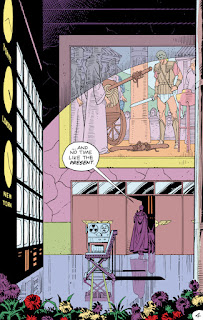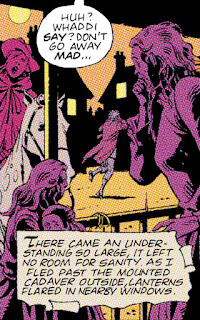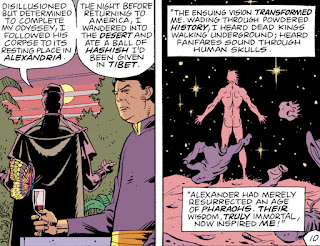Yes, it’s true I’m gettin a bit annoyed with Dave Gibbons inserting that blood splat/10 minutes to midnight image everywhere. But I absolutely love this cover. Such a minimal, yet colorfully haunting and perplexing sight for the penultimate issue.
I’ve said it before, and I’ll say it again. Adrian Veidt would have absolutely loved social media.
It is kind of cute that Adrian thinks he’s the first person in the world to think of a moral and intellectual dilemma like this. Didn’t America drop a couple of nuclear bombs on Japan in this reality?
Believing that Veidt is trying to cause World War III, Rorschach calls this the “heart of darkness.” But what would you call it when someone’s trying to prevent World War III? I guess it all depends on if you believe the ends justify the means — a philosophy that Rorschach often supports, according to the contradictory logic only he understands.
Alan Moore, like Adrian, worked really hard to conceal everything until after the “bomb” was dropped. Then it became a frenzied rush to explain every little detail all at once. But before that fateful moment was a vast, palpable silence of tension, articulated by this enormous painting of one of Adrian’s favorite stories. According to legend, the Gordian knot was an incredibly complex tangle of rope binding an ox cart to a post, with the belief that whoever untied the knot would rule all Asia. Alexander merely cut the rope with his sword. Some might say he employed an unethical tactic in solving the challenge. But Adrian praised him as a genius ahead of his time, who was able to think outside the box. I suppose it comes down to what you believe the priority was — untangling the knot or freeing the ox cart. With Alexander’s solution, the cart was freed quicker, but the rope was damaged beyond repair. With Adrian’s solution, peace may have been brought to the world, but in what condition did he leave the people?
And here it is. The moment where everything changed. Gibbons did place this panel in the middle of the page, highlighting its significance, but other than that, it’s so quiet and subdued, it’s easy to overlook.
The mariner in the pirate comic is able to understand the horrors he’s caused at the end of his story. But this Watchmen story ends before Adrian can have a similar moment.
Apparently this was the only issue where Gibbons really pushed back on Moore. Adrian’s monologue was originally even longer and Gibbons couldn’t fit it all in. But this overly verbose, self-aggrandizing speechifying is an essential element to his character. Without it, many readers (myself included) might end up liking him. But Adrian’s enormous ego makes him a thoroughly unlikable character, even to those who might agree with his tactics.
The mariner realized that he had caused the very thing he was trying to prevent. But he can’t quite understand how that happened. My simplistic explanation: He took the principle of allowing the ends to justify the means to the extreme.
Unlike Alexander, Adrian merely sought to unite the world, not rule it. But he eventually grew disillusioned with his hero once he realized how quickly Alexander’s kingdom crumbled. Paradoxically, he swiftly became enamored with the Egyptian pharaohs, deeming them “immortal.” Didn’t he realize that the pyramids only survived by the luck of their geographical location? How much of that hallucinogen damaged Adrian’s mind? Or is he actually insane like Rorschach believes? Of course, the best answer to that question is Dan’s response: With an intelligence like Adrian’s, it may be impossible to determine insanity.
Adrian’s servants were unfailingly loyal, and there was no apparent reason for him to kill them. He tries to justify this by mentioning the pharaohs who had their servants buried with him, but if he truly subscribed to that philosophy, then he would committed suicide at this moment. But Adrian wants to live and profit off his new world. I believe he was paranoid that one of his servants would eventually feel guilty and try to prevent Adrian from growing his fortune to even more obscene levels.
The interesting with this greenhouse was that Adrian designed it with a retractable roof. But down in Antarctica, there never would have been a good time to open it. Adrian always intended to destroy that greenhouse and bury his servants there. It’s a pity that none of them realized this when they helped him build it.
One final epiphany for the mariner: Davidstown was never in danger. But Adrian never realized that even with Dr. Manhattan taken out of the picture, the Soviet Union was never going to attack America. Richard Nixon would have eventually taken the “football” off his wrist, returned to the White House, and resumed business as usual. And I think that even in this alternate reality, the USSR would have eventually collapsed on its own.
It is great to see Nite Owl and Rorschach utterly intimidated by Ozymandias. We’ve seen the two of them pull off some pretty impressive stunts during this story, most recently Dan’s remarkable flight from New York to Antarctica in a tiny owl ship he built himself. Dan and Rorschach have also had their fair share of encounters with Dr. Manhattan, but Adrian unnerves them on a whole different level. It’s the culmination of this massive, technologically advanced base, combined with the sinister plot they’ve only begun to scratch the surface of, on top of what they already know about his physical and mental prowess. They’re in way over their heads here, and they both know it.
True, Rorschach is likely suffering from frostbite and pneumonia at this point, but it still is a rather embarrassing performance for him.
I still love how fluid Adrian’s fighting style is. Not a single wasted movement, everything flowing together in one seamless motion to take out the threat as quickly and efficiently as possible. All the other characters in this story are good fighters, but none of them are nowhere near this level of perfection.
This helps confirm my belief that Eddie Blake’s murder was partially motivated by revenge. I do believe that Adrian used his first fight against the Comedian to study his moves, but it still seems like he was really upset he lost. And although he can now credit the Comedian with opening his eyes, that process had to have hurt. Adrian genuinely wanted to unite the world with a team of superheroes. But instead his dream was crushed in a rather brutal, insulting way.
It’s kind of poetic (if improbable) how Moore brings all the minor characters together at Ground Zero. Refreshingly, some of these characters actually grew over the course of the story. Dr. Malcolm Long’s career and marriage are both in shambles. And just when it seemed like he had given up on humanity, he chooses to try to help some strangers in a fight on the street, unaware that this will be his final act.
This is where Adrian talks and talks and talks. Not everything he says is essential, yet it does help keep him unlikable. And I did like this bitter realization that Richard Nixon — of all people — has his name permanently engraved on the moon.
Bernard the newsman also has another bit of growth. Even though he previously gave his hat to his constant companion, he didn’t even know the boy’s name until now. After ranting about people not connecting with each other anymore, he abruptly — and sweetly — decides to follow his own advice.
This confirms my suspicion that Eddie Blake’s murder was a little bit personal. As much as Adrian tries to play it cool, he can’t help but relish the thought of Eddie’s world collapsing.
Adrian half-heartedly tries to justify killing Blake, but he really didn’t need to. Adrian knew Blake wouldn’t tell anyone what he learned, and even if he did tell someone, they wouldn’t be able to stop him. Neutralizing Dr. Manhattan makes absolute sense, but worrying about Rorschach’s delusions doesn’t. Adrian may be the smartest man on Earth, but that doesn’t put him above paranoia and petty grievances.
One of the most chilling lines in all comic book history. Perfection.
Bernard and Bernie are the first to be vaporized. Bernie read the Black Freighter comics over and over, not realizing that its author unwittingly contributed to this mass tragedy. Bernard read the headlines every day and constantly fretted over the end of the world, never dreaming that he’d literally be at the center of it.
Our supplemental material — the last of this series — is an interview with Adrian, conducted by Doug Roth, who played a role in helping send Dr. Manhattan to Mars.
From Roth’s point of view, Adrian hiring a handful of Vietnamese refugees is a noble act. But we have the hindsight of knowing Adrian always planned on killing them from the beginning. He wasn’t looking to help political exiles — he was looking for expendable cogs that wouldn’t be missed.
I don’t think even Alan Moore was bold enough to write a superhero who truly went after the root causes of crime and poverty. These are stories being published for profit by a large corporation. Understandably, they get a little queasy about anybody really challenging the status quo. So transformative ideologies like this have to be confined to the villains — even in works like Watchmen.
I had to look up the word Manichean. It basically means black-and-white, which perfectly describes Rorschach’s limited viewpoint. Yes, this is coming from the “villain” of the story, but it is Moore once again reminding readers not to root for Rorschach.
































